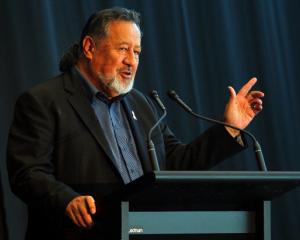Even before Parliament reassembles for the year, the temperature of politics rises.
Threats from the Maori Party to walk out on its pledged support for the National Government over the removal of a Treaty of Waitangi clause in state asset sales plans have been issued this week, putting immediate pressure on Prime Minister John Key and his Government.
While the matter is most likely to play out via compromise and accommodation, such is the nature of politics that at this point the outcome cannot be predicted with certainty.
The Maori Party has been compromised by being associated with Government. To win policy gains it has had to work with a party which is not seen as a natural ally to many Maori interests.
It has opened itself up to "Uncle Tom" criticism and left vacant territory for nationalistic and separatist elements, notably of course Hone Harawira, to occupy.
On this score, the partial state asset sales furore in one sense plays into the party's hands. It gives it an issue over which to flex its muscle - or stamp its collective foot - and assert its independence.
Co-leaders Tariana Turia and Pita Sharples have the opportunity to distance themselves clearly from the Government and to illustrate their determination to stand up for Maori interests and for the treaty. They have taken the limelight rather than Mr Harawira and company.
This follows the party's outcry over both the sale of the Crafar dairy farms to Chinese interests and the lack of references to the treaty or to poverty in Mr Key's recent speech about the year ahead.
Clearly, the Maori Party, which suffered setbacks at the last election, is determined to try to establish it is no stooge to National. This it must do for its very survival.
But it must be also be considered why section 9 of the State-owned Enterprises Act, which requires the Crown not to act in a manner inconsistent with the principles of the treaty, did not arise earlier.
That it did not might be considered a "bad miss" by the party. It could easily have been debated and sorted out before the election or when National and the Maori Party made their post-poll agreement.
Once again, however, hopes of Waitangi Day being a time of relative peace and calm, let alone togetherness and unity, are likely to be dashed.
Protests and cries about Maori being done down are bound to be expressed, with the partial asset sales and the treaty clause the convenient trigger and target.
Once again, too, the difficulties of inserting general references to the treaty into legislation - references which are vague and ill defined - are illustrated. Mr Key has suggested that section 9 was "largely symbolic".
Mr Sharples, and Maori interests, though, know that the steadily growing emphasis on the treaty over the past 30 years has led, and will lead, to many practical and monetary concessions to tribal groups and descendants who have links back to Maori of 1840.
They will maintain any move to lessen the place of the treaty must be resisted with vigour for fear that the special rights of those New Zealanders with some Maori ancestry might be curtailed. At the backs of their minds will be possible claims on the water or thermal resources used by the energy companies up for partial sale.
The fear for the Government and the taxpayer is that any residual treaty clause could lower the returns for the companies at sale.
Although the section might, in the end, mean little, it hangs there as a threat. It potentially opens a door to problems later on, making possible investors wary.
Bill English has been dispatched to try to mend the fences with the Maori Party and Mr Key is promising a consultation process.
Hopefully, a way can be found for Ms Turia and Mr Sharples and their party - while maintaining opposition to asset sales - to live with a compromise that frees private investors from treaty obligations.
Inserted into legislation 35 years ago, arguably the catch-all clause was poor policy then and it is poor policy now. This nation can do without such treaty-related entanglements.






